Picture this: a woman is walking from her bedroom to the kitchen. It’s dark in the hallway and the waist of her pyjama bottoms have settled below her hipbones causing the hems to drag on the floor. She is carrying her laptop in one hand, her drained coffee cup in the other. Her foot catches on the fabric pooling around her feet and she trips. The cup flies in one direction, the computer goes sailing in slow motion in front of her. She watches it crash to the hard floor and hears it shatter. She screams and falls to her knees. Her son comes running from the family room, thinking she has seriously injured herself, or maybe found one of the cats dead.
“What’s wrong?” he says. “Are you alright?
She can’t speak. She is sobbing. She lifts one finger and points to the laptop in front of her.
Yes, folks, this happened to me. You would have thought I had lost my very dearest friend. Inconsolable.
I was devastated. My beloved MacBook Pro had shattered. I was afraid to turn it over, like it was an injured child covered in blood.
Seems pretty silly, no? Before you agree, consider this. I am a writer, photographer, graphic artist and online art teacher. Every single thing I do is contained in that 14-inch rectangle. And there it was, skull cracked open, right in front of me.
Okay, so it is a little silly, but it made me realise something. It made me realise how dependent I am on a piece of technology. How much of my life is connected to a bunch of memory, RAM and gigabytes. I didn’t like that. I didn’t like it all.
Lots of us are using computers for some pretty important stuff these days, not only for work, but for staying connected to friends and family, running our households, our hobbies, and much more. Just take a moment and think about how much you really have invested inside your computer. I hope you’re one of the smart ones and back things up frequently; I had to learn the hard way. I’ve also learned something else: maybe it’s worth looking at how I did things before I had a computer in my life. And maybe those things shouldn’t disappear altogether.
After I found out my computer was going to cost almost a month’s salary to fix, I knew I was going to have to find a way to live without it. I could still use it, but with a shattered screen it was fragile (I couldn’t move it from where it sat or it would freeze and the battery jack wasn’t connecting securely) and there were obvious internal issues as well; its days were numbered. The first thing I did was print out a lot of my written work so I would have a physical copy. I found two ways to back up my 10,000 or more photographs, and I also decided to make physical copies of many emails that I consider to be important correspondence. Something about this growing stack of actual printed words on paper really felt nice to me. Something tangible. It had a presence other than a filename on my desktop, you know? It occurred to me that I was missing something about the way I used to do things, the hard copy, manual way. I also thought about how strange it is that most of our correspondence today is has no printed record. If the internet were to blow up tomorrow, what records would we have of our daily lives? Of course the internet is probably never going to blow up, but it still made me think.
I needed a way to write things down other than paper and pencil, because my handwriting was incredibly sloppy after long stretches, and it just didn’t seem practical to scribble everything down by hand. I also wasn’t feeling any trust for the reliability of my very broken computer. So, I went out and purchased a very inexpensive electric typewriter.
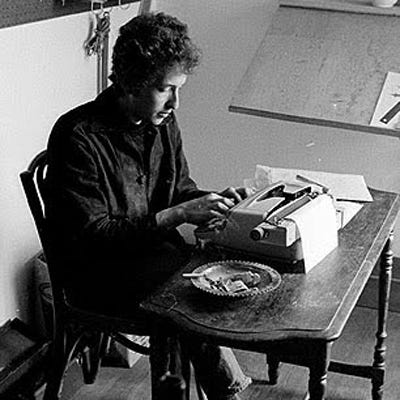
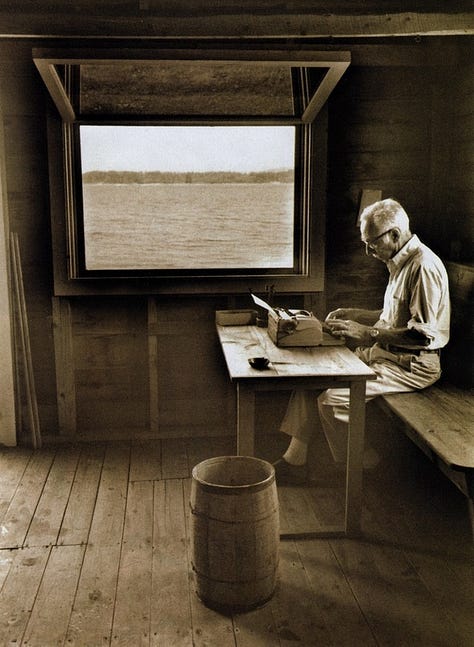
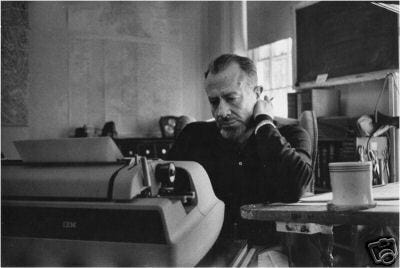
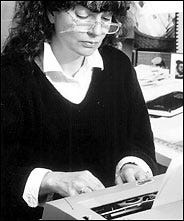

Well, it was awful. I had to sit at my desk because it had a fairly short cord. I don’t like sitting at my desk all the time. I like to write standing in my kitchen, or sitting cross-legged on my sofa. I like to write outside on my back porch if it’s nice and cool. It was also very noisy in an unpleasant way, the constant hum of electricity. It was bulky, and, to be honest, it felt cheap. What can you expect from an $80 machine? It did allow me to correct my typos, but the keys moved so fast and I was making so many mistakes I would be buying new correction ribbon in no time. So, by the end of the night I was online looking at old, manual typewriters through the spider web of cracks on my laptop screen.
I found one within an hour, $42.00, a 1964 Smith-Corona, the same age as I am. I ordered it without a second thought and it seemed like forever to wait the week it took to arrive. e.e. cummings had his 1940s Smith-Corona Clipper; Ernest Hemingway treasured his Corona 3. E.B. White wrote on an Underwood Standard Rhythm Touch, John Steinbeck gave us many novels and narratives with his Hermés Baby, and Sylvia Plath struck her poems onto paper with an Olivetti Lettera 22. I was now the owner of a Smith-Corona Classic 12. If it was good enough for all those real writers, it would certainly be good enough for me. I started typing, and I never looked back.
I didn’t write everything on my typewriter, then or now. The first drafts of poems are still scratched into my notebooks and then typed up over and over again with each new draft. I use my laptop (my dad surprised me with a new one a few months later) for anything that would go on the Web or needs to be sent through email. But for my personal writing projects, it was all done the old-fashioned way, letter by letter, word after word, ever-listening for that little ding that told me it was time to start a new line. I liked it more than I would have ever imagined. Why? It made me slow down enough to really think. And you know what? A typewriter feels intimate. She was more like a partner to my writing than my laptop had ever been. It’s kind of like I had bought myself a friend.
I named her Constance. She arrived all the way from Lindsborg, Kansas, quite patriotic in her red, white and blue trimmings. She’s not the ornamental type though and certainly not high maintenance. No cords, no on or off switch, and she never require a backup, update or more disk space. She doesn't require a finicky printer. She just needs a new black ribbon now and again and the sweep of a dust cloth. The first thing I noticed about her is how solid she feels, like I can afford to be a little reckless with her from time to time. She does appreciate it when I pace myself though. If my fingers fly too fast over her she gets her keys all in a wad and stops me dead until I get the hint and take things back to a more pleasurable speed. It certainly makes me a more careful writer. I’m not as wordy when we write together; my brain seems to work more efficiently when I am aware of slowing down.
Of course as we got to know one another I often found myself wondering about her past. Whose hands caressed her for all of those years? Did she travel to exotic places? Or maybe she just sat unused in a damp barn somewhere in Topeka. No matter. She was being loved and well-used in her new home. I have written many first drafts with her help. Not so much lately, but I need to get back to her gentle clacking, and soon.
Constance never yelps at me when I’ve made a mistake or misspelled a word. She does not lead me to be believe that she knows more than I, or that she is capable of correcting all of my shortcomings. She leaves my work for me. I have to rely on my good sense, or lack of it. She doesn’t allow me to dress things up to make them look better, either. No fancy formatting, fonts or millions of colours to choose from. With her it’s straight up ten pitch Pica, baby. Just black words marching along paper, the way it’s supposed to be.
Why did I name her Constance? Well, it has something to do with a book of poems by Jane Kenyon, but it also means that I know she will be my longtime companion as I struggle to get my words down on paper. She may not be readily available to me at anytime or place, or as effortless when it comes to rearranging my sentences or sending them across the universe as my high-tech friend, MacBook Pro. And I may not have the virtual world at my fingertips when she and I spend time together, but I could use a little less distraction anyway. I know she’ll be there, even as only a warm thought in my mind while I anticipate our next encounter. The best things require a little more effort from us anyways, don’t you think?
My pile of typed pages continued to grow for several years after she arrived. Most of them will never see the light of day, but they’re a reminder of the time I’ve put in to my craft. The time I spend writing with her has been my very best writing time, even if it’s not my very best writing. It feels, I don’t know, more real. Just me, my thoughts and the clacking of keys. She has been utterly dependable. I even dropped her once and all she did was give off a chime when her carriage flew back into place.
There is always a silver lining, even to what at first seems like a horrible (and expensive) mistake. Yes, I walk more carefully when carrying my $1200 laptop these days, but if that had never happened I wouldn’t have known what a special relationship it could be, the writer and her typewriter, one key-strike on the page at a time.
Do you still have a typewriter? Do you use it? I would love to hear more.






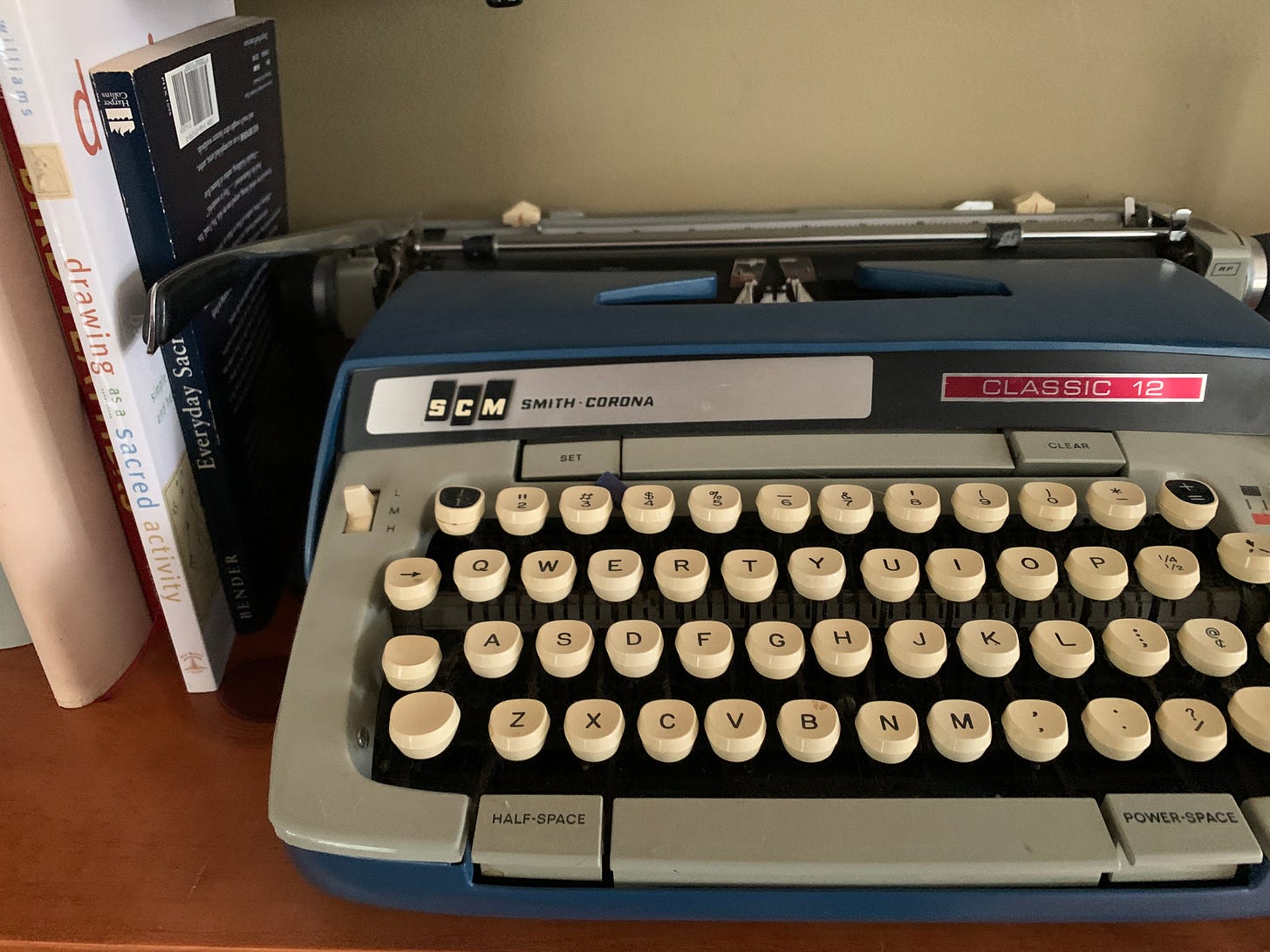
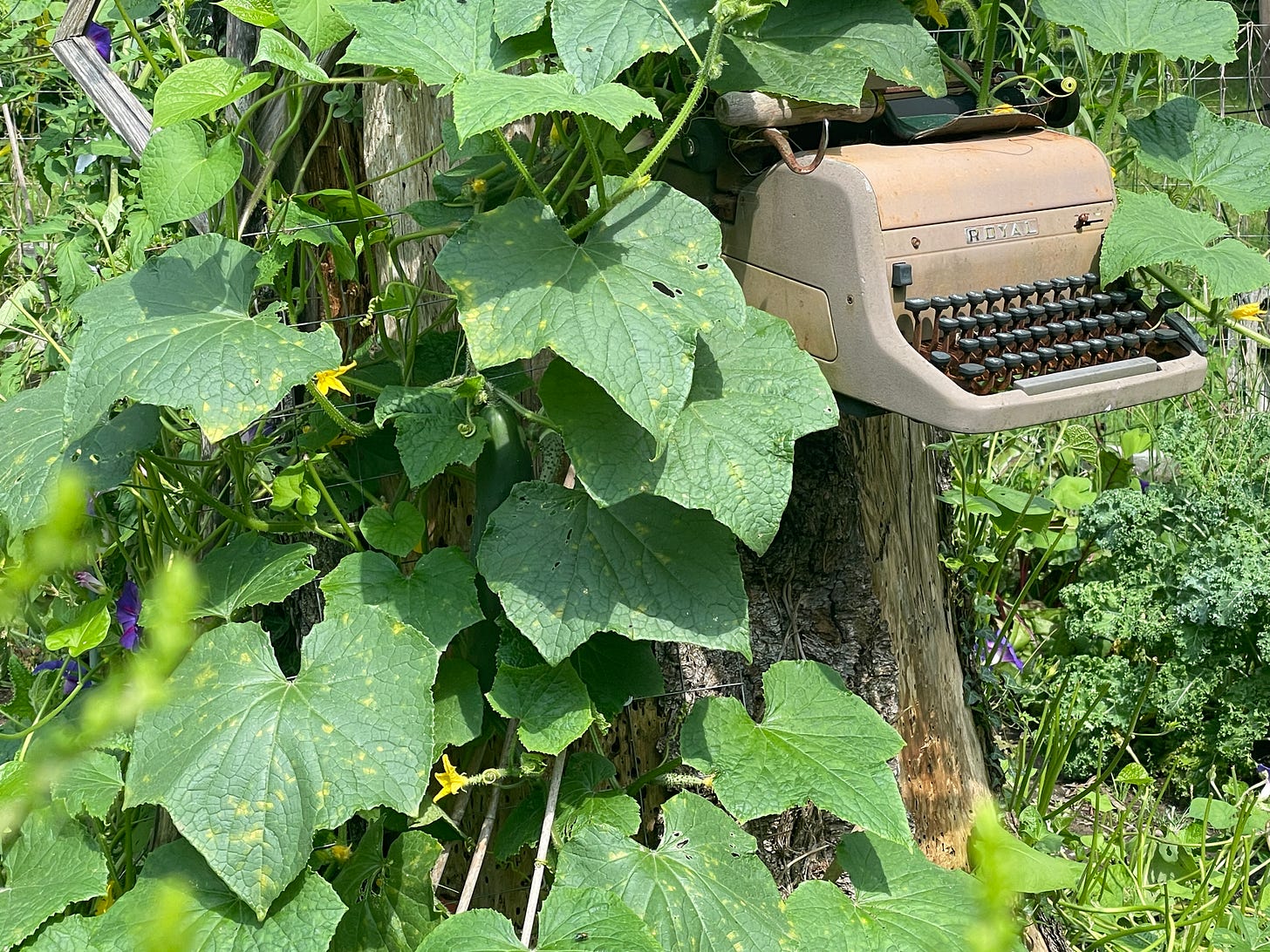
once again, a bona fide home run of an essay, one which i can relate to in so many ways. my preferred writing methodology has always been the paper and favorite Bic, in lieu of the fact that i have always had an aversion to typewriters. I have always wished i had inherited my mother's acumen around a typewriter (she could type 90 wpm no sweat) and always said THE typewriter to use was the IBM Selectric with that little ball of letters and characters that bounced around creating words on the paper strapped to a motionless carriage. I now se a computer (begrudgingly), and friends say i would beso much happier with a mac laptop. i'm not so sure; it's still a computer, and i have a jaundiced view of them since my grad school days (it's explained more in my memoir). i loved the story telling saga of the "accident" which occurred with the demise of ur trusty tool of transcription (with the priceless autocorrect and spellcheck miracles included. long story shortened: i loved ur article; perhaps one of ur best; keep'm coming, girl.
I love this!! I try not to think too hard about how dependent I am on this little Macbook - who is getting a bit elderly (fear not, I'm a pathologically compulsive backer-upper!)
I have an ancient Underwood that my hubby bought me for Christmas many years ago. Alas, it doesn't work well -- something wrong with the winding mechanism for the ribbon so I have to hold one spool as I type -- but the few things I've tapped out on it feel imbued with a particular kind of magic. So it's mostly decorative at this point, a quiet reminder of what I'm meant to be doing in this little room. But now you've got me thinking about finding a typewriter I can actually use....:)